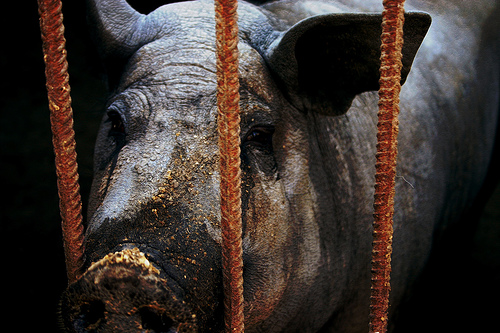U.S. coal companies claim that exporting low-grade coal from the Powder River Basin through ports in the Pacific Northwest to Asia is big business, a sure thing, easily worth the pollution and disruption the new coal infrastructure would cause. Their case to investors, local communities, and state regulators is based on a simple premise: China’s demand for coal is steady and rising. And that does seem to be the conventional wisdom.
But there are reasons to think the premise is false, and that the extraordinary sacrifices being asked of Northwest communities — dozens of trains a day passing through, spewing dust and noise; gigantic, polluting ports crowding out the cultural amenities in some of America’s most bucolic coastal towns — will lead not to jobs and enduring prosperity, but wasted time, wasted money, and disappointment.
I’ve been seeing threads of this story here and there for a while. Now Greenpeace USA has done us the service of weaving them all together into a (remarkably brief and readable, as these things go) new report: “The Myth of China’s Endless Coal Demand.” It acknowledges that China will continue to rely on coal in the short term, but notes that long-term trends are not in coal’s favor:
[China] is deliberately, and quite effectively, decoupling its economic growth from coal such that future economic growth may not manifest in increased coal consumption. The results of this decoupling are already present: A rapid expansion in hydroelectricity, wind, and solar has pushed down coal’s share of energy production from 85% to 73%, and this trend will continue. …
… Assuming Chinese coal demand continues to weaken and that it sticks to its policies to curb coal use and increase renewable investment, the Chinese market for US coal exports may dry up before major new US coal shipments ever reach its ports. [my emphasis]
Imagine all those coal trains and ports built only to find that the market for their wares has collapsed. It’s not hard to imagine — it’s happened before! (See No. 8 below.)
Here are the report’s nine reasons why China’s coal demand will not be steady and rising, not enough to justify risky bets on U.S. coal ports:
- A desperate industry — not sound economics — is driving U.S. coal export proposals.
- China produces nearly all of the coal it consumes.
- China’s economic growth is slowing.
- Coal use in China is flattening out.
- Chinese policy caps on coal production and consumption will decouple economic growth from coal.
- Renewable energy is on the rise.
- Chinese society is resisting coal and becoming more aware of its impacts on health and water.
- Unstable Asian demand has sunk U.S. coal export proposals in the past.
- International competitors recognize flagging Chinese demand.
You can dig into the report for facts and figures on all those, each of which is probably worth its own post. A great deal hinges on the Chinese government’s ability to get a handle on provincial party leaders who have spent decades being rewarded for growth (said growth measured in part by the rise in energy use). If China’s central government makes decarbonization and energy efficiency tickets to advancement in the party, it could meet or exceed its ambitious energy-intensity targets. And it’s difficult to predict the course of civil unrest, but given the severity of the air-quality crisis in China and the fact that some large cities are banning further coal development outright, it’s not hard to see a middle-class coal backlash accelerating the process more than anyone now expects.
(Side note: For a careful and thorough examination of how the Chinese government is currently doing on its energy goals, see “China’s 2012 Energy Report Card” from super-wonk Trevor Houser.)
Are Pacific Northwest towns really going to gamble on Chinese coal use? In this day and age? The Chinese themselves are explicitly working to rein coal in; they recognize, with the rest of the world, that their rising coal consumption is the single global energy trend most likely to doom future generations to an out-of-control climate. Seems like kind of a creepy thing to hang your economic future on, doesn’t it?
The Pacific Northwest is full of climate hawks and innovators, entrepreneurs and green-minded politicians. It is well-positioned to be a leader in the 21st-century race to sustainability. What a disaster it would be, how pathetic, to enter that race hobbled by a flailing last grasp at dirty coal money.



